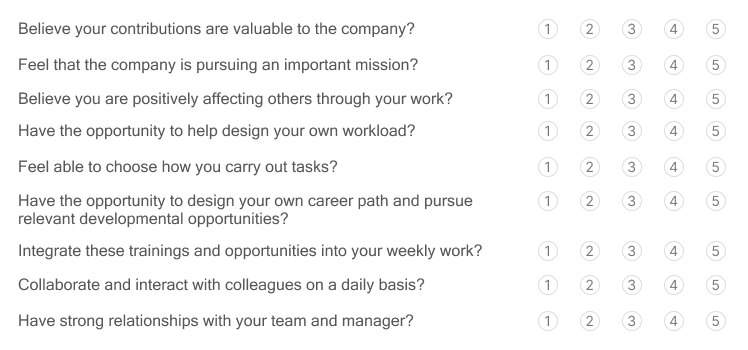Being engaged in meaningful work increases employee motivation dramatically. In fact, meaningfulness is the single most important aspect of work to employees—more important even than pay or working conditions, research has found.
Nine of 10 employees would actually accept a lower salary in exchange for more meaningful work. The desire for meaningful work is especially high for Gen Zers and Millennials, Forbes notes. Let’s discuss why meaningful work holds such importance, along with the psychological aspects of work that can make it feel more purposeful. Then, we’ll discuss strategies for making work more meaningful for all employees.
Table of Contents
1. The Psychology of Meaningful Work
2. Strategies to Enhance the Meaningfulness of Work
3. Cultivating a Culture that Values Meaningful Work
4. Tools and Practices for Sustaining Engagement
The Psychology of Meaningful Work

Meaningful work meets innate psychological needs, according to Frank Martela and coauthors in The Journal of Vocational Behavior. According to self-determination theory, they write, autonomy, competence, and relatedness are essential to promoting well-being, vitality, and development. They highlight the role of beneficence as a fourth component of meaningful work as well, describing these four psychological pathways to meaningful work:
- Autonomy: Degree of ownership over one’s work and control over how it is done.
- Competence: Level of mastery of job responsibilities.
- Relatedness: Sense of connection with others, along with the feeling that one’s manager and coworkers care about their wellbeing.
- Beneficence: The sense that one is positively influencing the lives of others.
Further, meaningful work aligns with employee values and aspirations. Autonomy and competence within their role will allow employees to be their authentic selves and move toward their career goals. As a result, they’ll truly thrive.
The Impact of Meaningful Work on Engagement
Disengagement and high turnover result when employees feel detached from their work. Not finding work meaningful can lead to “quiet quitting”—being disengaged and doing the bare minimum to get by. In contrast, engaged employees will feel driven to contribute at a higher level. By helping people find meaning in their roles, you’ll boost employee engagement and strengthen their performance.
In turn, engaged employees will be far more likely to remain committed to the organization for a long time. High employee engagement reduces turnover by 18–43%, Gallup has found. Hence, connecting employees with meaningful work will play a key role in combating high turnover and boosting retention.
“Research [has] demonstrated that employees who perceive their work as meaningful are, among other things, more committed to the organization and less likely to leave,” write researchers in the journal PLoS One. “They are also more engaged and more productive than employees who do not consider their work as particularly meaningful. Even more so, the experience of a lack of meaningful work has been linked to negative outcomes like increased cynicism.”
Meaningful work dramatically enhances quality of work life and even improves mental well-being, too. Finding their job meaningful reduces burnout and increases employees’ passion for their work, boosting job satisfaction, as the researchers share. Employees’ productivity and quality of work will improve, along with workplace morale, as they bring renewed energy to their role.
Assessing Work for Meaningfulness
Here’s a simple framework to use for assessing the meaningfulness an employee finds in their work. Ask employees to consider these questions, with 1 being the lowest rating and 5 being the highest. Then discuss them together in your one-on-ones.
Do you …

Equipped with the answers to these questions, you can find ways to make work more meaningful, using the strategies below.
Strategies to Enhance the Meaningfulness of Work

Infuse purpose into everyday tasks with the actionable strategies we’ll discuss here. From strengthening work culture to offering robust developmental opportunities, they’ll help every employee find more meaning in their role.
Connect Work with Values
To feel meaningful, work needs to connect to employees’ values, so help them see these connections. Talk about the organization’s mission and values, emphasizing the purpose of the work you’re doing together.
Likewise, company leadership should work to design and communicate a vision that resonates with employees, instilling a deep sense of purpose. They must tell the story of what they want the team to accomplish together in a compelling way. “When you tell a good story, you give life to a vision. A good storyteller creates trust, captures hearts and minds, and serves as a reminder of the vision,” says the Center for Creative Leadership.
Ask about what each individual values most and discuss how it connects to those values. For instance, values could include taking smart risks, promoting equity, driving innovation, striving to learn from each day, or prioritizing environmental responsibility.
Building a Sense of Community
Having supportive relationships will make work feel more meaningful, as MIT Sloan Management Review says. The sense of teamwork will increase as a result, along with commitment to serve the team.
Here are a few ways to foster community:
- Create team events. Hold a volunteering day or another activity outside of work.
- Hold company or team retreats. Even mini-retreats (e.g., half-day events) can be instrumental in building community.
- Meet up periodically for meals, even if you don’t work in the same location. Or hold “lunch and learn” sessions.
- Conduct group trainings with Q&A opportunities.
Establish shared goals, too. This fosters the sense of being part of a collective, along with deeper collaboration. Strategic goal-setting will enhance work culture and workplace morale by strengthening the sense of community.
Emphasizing the Value of Their Work
Help employees see the value they deliver in their work and how it shapes broader outcomes. You can do this in several ways:
- Illustrating how their work led to the success of a project.
- Asking a client to share how employees’ efforts have personally benefited them.
- Making sure managers are sharing gratitude with employees regularly.
- Asking senior leaders to thank people at all levels for their specific efforts.
By taking these steps, you’ll help employees see the tangible outcomes of their efforts. You’ll also make each employee feel appreciated and recognized.
Enhancing Self (and Other) Awareness
Self-awareness, a core component of emotional intelligence (EI), equips people to find greater fulfillment at work. By becoming self-aware, employees can find creative solutions to challenges, as researchers write in Harvard Business Review (HBR). In this way, self-awareness promotes flexible thinking, strengthening adaptability and problem-solving ability.
Awareness of how others are feeling is another core element of EI. By enhancing people’s ability to respond creatively and effectively to interpersonal challenges, it leads them to have a more meaningful experience at work. Paying more attention to their work relationships tends to positively shape these relationships and help them notice their positive aspects more, as the researchers say. In turn, this makes work more meaningful. For instance, when they notice colleagues asking for their help, they’ll feel flattered.
Basic mindfulness practices can help them tune into these positive moments, the authors note. You could even take a couple minutes during team meetings to take turns acknowledging moments like these. In turn, this will help people cultivate more of these positive moments.
Engage in Job Crafting
To the extent possible, tailor each person’s job experience so it feels meaningful to them, which will boost autonomy. In today’s business world, job crafting can be pragmatic due to the constantly changing nature of roles.
Job crafting means redesigning a role to match an individual’s preferences, through steps like these:
- Expanding or reducing the scope of a role to focus more on what they’re most passionate about.
- Creating more variety in their work, assigning them to different tasks based on need, or reprioritizing requests.
- Increasing collaboration and social interaction.
- Adding educational opportunities as a daily priority.
- Increasing responsibilities, like training other employees, helping a manager with higher-level tasks, or leading a project.
- Offering opportunities to work more directly with clients or customers.
- Reframing how they perceive tasks (e.g., discovering how mundane tasks support a broader purpose). They may not enjoy every task equally, but they can connect to purpose within them nonetheless.
Finally, let’s examine the role of training and development in increasing meaningfulness at work.
Promoting Personal Growth
People will find work more meaningful when it brings continuous opportunities for growth. Each day then becomes an opportunity to learn or practice new skills. In turn, these competencies could serve as stepping stones to exciting career moves. Give them a say over the kinds of training experiences they engage in. Work with each employee to create a personalized developmental plan, then review the menu of learning options. Consider stretch projects, mentorships, job shadowing, cross-functional training, online training modules, webinars, and conferences, for example.
When you bring together these different elements that give work meaning, you’ll achieve a state of holistic meaningfulness that dramatically enhances fulfillment at work, as MIT Sloan says.
Workplace morale will improve as you take all of these steps, too. You’ll also affirm your commitment to the success of each individual and enhance employee motivation to succeed.
Cultivating a Culture that Values Meaningful Work
Strive to build a company culture that prioritizes and celebrates meaningful work. Build this positive work culture by promoting curiosity and allowing people to contribute at a higher level.
“People tend to experience work as meaningful when they feel like they are contributing to creating something new — especially when they feel able to explore, connect and have an impact,” say Lewis Garrad and Tomas Chamorro-Premuzic in HBR. “Curious leaders help people find meaning at work by exploring, asking questions, and engaging people in ideas about the future.” Work then becomes more dynamic and interesting, and employees will make important contributions as you unleash their potential.
Tools and Practices for Sustaining Engagement
To maintain high levels of employee engagement, use tools that promote meaningful work experiences:
- Goal-tracking software, which keeps motivation high.
- 360 feedback solutions to promote continuous improvement and strong collaboration.
- Employee feedback tools, which allow you to conveniently share daily tips, insights, and praise.
- Performance evaluation software to enrich conversations between managers and employees.
- Employee surveys to find out what will improve their work experience by asking them directly!
By helping all employees find more meaning in their work, you’ll greatly improve the employee experience, address high turnover, and improve job satisfaction. Furthermore, you’ll achieve more ambitious results as an organization when employee motivation and drive to excel increase. Through the strategies outlined here, HR and organizational leaders will foster a purpose-driven workplace where everyone thrives.
Learn more about how the right tools can make work feel more meaningful. Demo our product!
